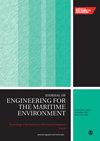Exergy efficiency and EEXI analysis of a marine power plant at partial load conditions
IF 1.5
4区 工程技术
Q3 ENGINEERING, MARINE
Proceedings of the Institution of Mechanical Engineers, Part M: Journal of Engineering for the Maritime Environment
Pub Date : 2023-11-14
DOI:10.1177/14750902231207133
引用次数: 0
Abstract
Energy efficiency and environmental protection are becoming more important in the world. Almost 90% of the world trade is carried by sea which makes energy efficiency very important for the maritime sector. Exergetic method is a powerful scientific tool for measuring energy efficiency. The ships are not always cruising at maximum load conditions. The situations such as narrow water passages, maneuvering, and, hoteling etc. are partial load conditions and the exergy loss in power systems reaches maximum values at these conditions. Besides the new IMO regulation forces the sector to reduce emissions through Energy Efficiency Existing Ship Index (EEXI) and one of the most popular solutions is Engine Power Limitation (EPL). In the literature there are limited studies investigating exergy efficiencies of partial load conditions of a marine power plant. In this article, the performance analyses of a combined power system in partial load conditions are carried out using exergy method. The considered partial load conditions are maximum-ahead, full-ahead, half-ahead, slow-ahead and dead-slow-ahead loads of the engine. The results show that, the exergy efficiency of the overall system is decreasing at lower load conditions. It is observed that the maximum exergy efficiency is 51.6% which is reached at 96 rpm. The best condition considering both exergy efficiency and EEXI is 80 rpm of main engine. At slow-ahead and dead-slow-ahead conditions the exergy efficiency decreases to about 33%.部分负荷条件下海洋发电厂的能效和 EEXI 分析
能源效率和环境保护在世界上正变得越来越重要。世界上几乎 90% 的贸易都是通过海运进行的,因此能源效率对海运业来说非常重要。能效测量法是测量能源效率的有力科学工具。船舶并不总是在最大负荷条件下航行。狭窄的水道、机动、停泊等情况都属于部分负荷条件,在这些条件下,动力系统的放能损失达到最大值。此外,国际海事组织(IMO)的新规定迫使船舶行业通过现有船舶能效指数(EEXI)来减少排放,而最流行的解决方案之一就是发动机功率限制(EPL)。文献中对船用发电厂部分负荷条件下的放能效率研究有限。本文采用放能法对部分负荷条件下的联合动力系统进行了性能分析。考虑的部分负荷条件包括发动机的最大超前负荷、全超前负荷、半超前负荷、慢超前负荷和死慢超前负荷。结果表明,在较低负载条件下,整个系统的放能效率在下降。据观察,发动机在 96 rpm 转速时的能效最高,达到 51.6%。同时考虑到能效和 EEXI 的最佳条件是主机转速为 80 rpm。在低速前行和死低速前行条件下,能效降低至约 33%。
本文章由计算机程序翻译,如有差异,请以英文原文为准。
求助全文
约1分钟内获得全文
求助全文
来源期刊

CiteScore
3.90
自引率
11.10%
发文量
77
审稿时长
>12 weeks
期刊介绍:
The Journal of Engineering for the Maritime Environment is concerned with the design, production and operation of engineering artefacts for the maritime environment. The journal straddles the traditional boundaries of naval architecture, marine engineering, offshore/ocean engineering, coastal engineering and port engineering.
 求助内容:
求助内容: 应助结果提醒方式:
应助结果提醒方式:


